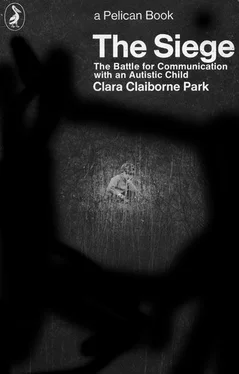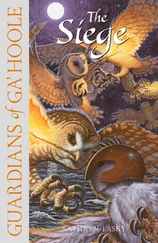I nursed Elly, as I had the others, for nine months. Her head was small and warm like the others’, her body snuggled soft against mine. It broke my heart to wean her. I am a thin woman, grown from a nervous child, a nail-biter, a ring-twister. Serenity is not natural to me; I value the rare experience that brings it.
Beloved, may your sleep be sound,
That have found it where you fed.
The long hours spent nursing my children, relaxed, not moving, only functioning, each of us completely satisfied in the other, were to me the happiest times of their babyhood.
When I weaned her, Elly was still very much a baby. Other people’s children, after six months, begin to do all sorts of things — they sit up, they crawl, they fall down, they eat pins. At an age when other people’s children are pulling themselves to their feet in their playpens, mine are still flat on their backs on a blanket. I had got used to this long before Elly came. Matthew had not sat up until eight months; Becky, who had not crawled till eleven months, was seventeen months old before she stood alone, nineteen months old before she walked. Elly followed a month behind. At nine months she finally sat alone. At a year, she crawled. Months went by and she did not walk. Another family might have worried at such slow progress. We felt no reason to. Elly crawled very well once she began. It was true that even when she became mobile she seemed satisfied with very little, but what mother of four does not consider that a virtue? Does not Spock point out that babies may prefer very simple toys? She did not want to put rings on a stick, but I knew already that not all babies did. I remembered vividly that Becky had taken the educational toys that Sara had delighted in assembling, and methodically dropped the parts, one by one, down the stairs.
So when did it begin? A friend, also a mother of four, tells me she began to wonder as early as eight months, seeing Elly lying in her baby-tender, content without even a rattle in her hand. Has she hit on something significant? And there are pictures from around nine months or so (dates are vague; it did not occur to us that one day Elly would be a case-history). The friendly bubbly smile is gone, and there is only one picture in which she faces the camera. She looks serious. Had it started then? But those photographs were taken on one day. There are often days when a baby doesn’t photograph well. Perhaps Elly was tired that day. If I could go back I’d know in a moment. I can never find out now.
Was it significant that as early as eight months, propped up in a chair, she showed that strange quivering tensing of all muscles in a kind of passing paroxysm — that response to intense interest or pleasure which has been with her ever since yet which no doctor has ever seen? Was it significant that as she approached a year she would not play hide-and-seek behind a diaper? If I held her on my shoulder and her father dodged up at her from behind my back, instead of discovering him, as the others had, with squeals of pleasure, she paid no attention. But children differ, and not everyone likes the same games. Elly seemed independent and cheerful. All this description is based on hindsight. We noticed nothing then.
One looks for a trauma and finds none. She was rarely sick, never severely so. A few stopped-up noses, unaccompanied by fever. Chicken pox at six months — an unusually mild case. At seventeen months, an earache. We guessed because she whimpered and rubbed at her ear, for she was not talking. We played safe and called the doctor — for the first time in her life. She was already better when he came, leaping up and down in her crib and laughing. I remember he exclaimed, ‘What a lovely baby!’ Yet surely it had begun by then.
She was not ill, nor was I. No one was hospitalized. We left her only once, when she was nine months old, and then only for a weekend. Nonplussed, one looks for less obvious causes — events and experiences that went unnoticed at the time but that could later reveal their true significance. Once a child ran with her in her stroller, hit a bump, and pitched her out on her head. An injury? But I picked her up undazed, crying lustily, her eyes not even crossed. Then there was the trip we took in Elly’s second summer, a month after her first birthday. It was a typical station-wagon safari from friend’s house to friend’s house. The first part of the trip had been pleasantly uneventful. We had driven to Rhode Island, stayed there a week, and were now on our way to Maine. We broke the trip in the middle, staying with a student who put up all six of us in a room of his boarding-house. Two beds, floor covered with mattresses, Elly in her car-bed, by now too small for her. She didn’t like it, and cried, and I spent most of the night rocking her, though ordinarily she was a good sleeper. Nobody slept well, and the next day’s drive was one of those trivial nightmares that any family lives through on occasion. The children were intermittently crabby, we ran out of gas, we even lost a five-dollar bill out of the window. Elly was fretful from the start. She wouldn’t go to sleep, and by the time we had been going half the day she was crying steadily. We arrived exhausted, and spent the next three days confined to the house by a nor’-easter as seven children who didn’t know each other interacted in one not-very-large living room. Elly fretted constantly. I had never seen her like this. Then the weather lifted, she crawled outside, alone in the quiet garden, and we had no further trouble. Did it start then? Was that cramped and crowded week the beginning of her retreat?
I doubt it. Nothing so ordinary should be able to cause a major psychological disaster in a baby — not if the baby were healthy to begin with. But I record it nevertheless, as I record here everything I know of those first two years — the measles and the colic and the bump on the head and the fact that I was an intellectual mother by no means totally accepting of her feminine role, who did not at all want another baby. Out of these come the possible explanations — out of these, or out of whatever may in time be elucidated in the complex balance of a baby’s metabolism or the choreography of the electrons in its brain. Every piece of potential evidence must be recorded in this account, not least the evidence that can be used against me. We need to know all we can if someone someday is to understand at last what is relevant and what is not.
So Elly grew, and though we look back and remember one incident or another, the onset of the condition was imperceptible. We perceived we had a child who, at twenty-two months, was not toilet-trained — but neither were most of our neighbour’s children. She did not walk, but the little boy down the street had sat contentedly in his playpen until he was two. She did not use a spoon — but she fed herself efficiently with her fingers. She spoke only a few words — but the onset of speech in children is notoriously variable, and every parent of a slow talker is aware that Einstein didn’t talk until he was four. The various signs that now seem so clear then seemed easily attributable to individual differences. One should not, after all, push one’s children. How many times did someone remark that of course I was so used to bright children that when I got an ordinary one I thought it was slow? Elly seemed alert, beautifully co-ordinated, and contented. We stored up the differences in our minds but we did not worry, having learned in ten years of parenthood that events usually render worries irrelevant, and that worry itself can harm a child more than most of the conditions one worries about.
Only we began gradually to be aware that we had begun to think of Elly as a ‘difficult’ child. She had been such an easy fourteen-month-old. Since she didn’t walk or even crawl upstairs it had been simple to keep track of her, although it was hardly necessary. Extreme in her caution, delicate in her judgement of levels and edges, she seldom fell and rarely hurt herself. I could be sure she would open no bottles, turn on no faucets, teeter on no high stools. And for some time, busy with my other children, I was pleased that she made so few demands on my patience. She crawled contentedly about, never very far away; she took long naps and bounced gaily in her crib when she woke up. She did not attempt to climb out, but neither had the other children at that age, and if she did not call me, I thought nothing of it. This was independence. She made few demands upon me and I made few upon her. She was so self-contained, so cheerful in her limited round of activity, that there were none of those battles of wills that take place between mothers and more active children. I began to put her on the pot at thirteen months, after breakfast, with a cookie, as I had Becky and Matt. There was some response for the first week or so, then nothing more. I let it go ‘until she was ready’. I could afford to be relaxed, with a mother-of-four relaxation. I did not know she would not be ‘ready’, even partially, for four more years. I made no issue over her learning to spoon-feed herself. She ate neatly, and since she took all her meals at the table with us it was easy to feed her the sloppy foods her fastidious fingers would not touch. Least of all, in our family, did it seem necessary to urge her to walk. So life with Elly was easy — until some time in the second half of her second year, when gradually we began to feel it wasn’t easy any more.
Читать дальше












